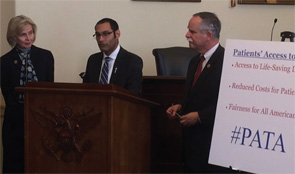
Will Harvey, MD, MSc, ACR Government Affairs chair, joins
Rep. David McKinley (R-W.Va.), right, and Lois Capps (D-Calif.), left, at the PATA reintroduction on March 25, 2015.
Rheumatologists and rheumatology health professionals make a difference every day in the lives of patients. And through the work of many devoted members, the College takes that commitment beyond the care setting and into the policy arena to Advance Rheumatology! on Capitol Hill and in state capitols across the country.
I want to take a moment to highlight a few of our advocacy initiatives and then make a personal request of you. ACR advocacy is driven by improving access to care, including access to rheumatologists, access to the best treatments and access to breakthrough discoveries through medical research.
Ensuring Patients Can See a Rheumatologist
We can improve the lives of our patients by first ensuring rheumatology practices can be managed efficiently and sustained financially. Two advocacy issues bearing on this subject at the moment relate to the status of Medicare payments and ICD-10 implementation.
SGR
We have long sought relief from the Sustainable Growth Rate (SGR) payment formula. Since 2003, Congress has had to repeatedly block drastic cuts in payments. For many years, we have discussed this issue with lawmakers, and over the past several years, the ACR has been asked to weigh in more than a dozen times on various iterations and details of proposed legislation.

SGR
It’s gratifying to write that in March, the U.S. House passed SGR repeal by a vote of 392 to 37, an astonishing bipartisan margin. The Senate followed suit in April, voting 92–8 for passage, and the president signed the bill into law. Ending the SGR once and for all was an historic and long-overdue policy victory for all of medicine and our patients. We can now move forward without the burden of uncertainty about the future of physician payments.
Here are some details about the passed legislation, now law. The SGR repeal bill, H.R. 2, does the following:
- Finally repeals the SGR, averting the 21.2% cut in payments for 2015;
- Implements a 0.5% positive payment update for five years beginning this June;
- Sunsets PQRS, Value-Based Modifier and Meaningful Use programs in 2018 and establishes a single quality reporting and payment system (Merit-Based Incentive Payment System, MIPS);
- Preserves fee for service as an option;
- Provides bonuses above the baseline update if providers score well in MIPS categories; all physicians may qualify for bonuses;
- Pays bonuses if providers participate in an Alternative Payment Model (APM);
- Allows the ACR a voice in quality metrics and promotes registry use;
- Provides financial support for small practices to develop new models or participate in MIPS; and
- Links payments to meeting thresholds rather than a competition model.
The MIPS will reorganize current pay-for-performance plans into a single entity, beginning in 2019. The status quo will continue through 2018, without the threats of SGR cuts and with a slight positive payment update. Many of the details of MIPS are a work in progress, but we will have opportunities to influence its implementation.
